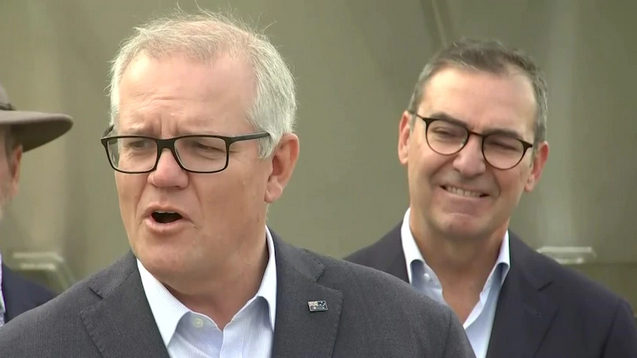The two existential threats that keep former chief of defence Admiral Chris Barrie awake at night are nuclear war, which he says the Australian government can’t do much about, and climate change, which he says the Australian government is not doing enough about.

|
|
Former Chief of Defence Admiral Chris Barrie is calling for
urgent action on climate change. Credit: Andrew Taylor
|
“As ex-service members and experienced practitioners of national and international security who have witnessed up close the devastation of war and crisis, we recognise that climate change is a fundamental threat to the security and prosperity of all Australians,” he said.
“Yet Australia is ill prepared for climate impacts, with climate security risks not being fully assessed or understood in Australia.

|
|
Climate change a security threat in Australia, says intelligence
expert
|
A spokesman for Energy and Emissions Reductions Minister Angus Taylor said that Australia was responding to climate change by reducing its emissions faster than many of its peers.
“Between 2005 and 2018, Australia’s emissions fell faster than Canada, New Zealand, Japan, Korea or the United States. Over that same period, half of G20 members actually increased their emissions,” he said.
Admiral Barrie said he had seen scenarios which outlined the potential impact of Bangladesh’s coastal areas becoming inundated in the foreseeable future, prompting mass forced migration and resulting in tens of thousands of climate refugees attempting to reach Australia by boat.
“These are the kinds of prospects that we need some leadership over. It involves the whole nation, it involves every one of us. We all have to pull this boat. And that includes the federal government,” he said.
“The problem is we don’t have an action plan, so we are wandering around in circles trying to figure out what to do.”
Admiral Barrie said he believed United Nations climate talks in Glasgow in November will be the last chance the world has to properly address the threat.
“What we want is an action plan, so that we can get on at all throughout our community, all through our local governments, our state and federal governments and start pulling together in one direction.”
He said the climate summit hosted by United States President Joe Biden at the end of this week was a crucial opportunity for world governments to voice their support for immediate action.
“It is a leadership issue, and I think it is a pity that a group like ours has to get together and say that.”
Founding members of the group include former deputy chief of the Royal Australian Air Force Air Vice-Marshal John Blackburn, AO, and former Defence Department director of preparedness and mobilisation Adjunct Associate Professor Cheryl Durrant.
“The first duty of the Australian government must be the safety and security of its citizens. Today, the government is failing to address the growing impacts of climate change and therefore failing to protect its own people. Unlike the pandemic, we cannot quarantine ourselves from climate change and there is no vaccine.”
Associate Professor Durrant said a review of the threat was critical to filling in a “major strategic gap” in Australian security planning.
Links
- (AU) Climate Change Is A Security Threat The Government Keeps Ignoring. We’ll Show Up Empty Handed To Yet Another Global Summit
- (USA) Intelligence Forecast Sees A Post-Coronavirus World Upended By Climate Change And Splintering Societies
- (AU) Climate Change ‘A National Security Threat’: Report
- (USA) ‘Mutual Suicide’: US Issues Stark Warning On Climate Change
- Climate Change 'The Biggest Security Threat Ever Faced By Modern Humans', David Attenborough Warns
- Sea-Level Rise From Climate Change Could Exceed The High-End Projections, Scientists Warn
- Preparing For When Climate Change Drives People From Their Homes
- A signal of hope as US and China find common ground in climate crisis
- What keeps climate scientists like me awake at night - and why the next 10 years are so critical
- Facing the climate ‘endgame’ in a world bound for 1.5 degrees warming



